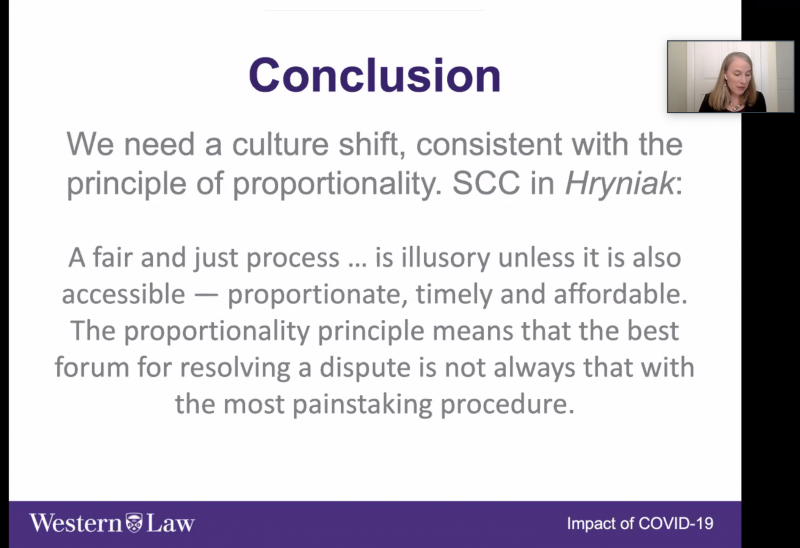
COVID and the Courts
Faculty of Law moves annual Distinguished Visitors Lecture Series online
The Faculty of Law’s annual Distinguished Visitors Lecture Series is forging ahead this year, moving online with virtual talks given by renowned legal scholars. This week, the series kicked off with a talk by Western Law’s Assistant Professor Suzanne Chiodo who spoke on “Six Months in a Pandemic: The Impact of COVID-19 on the Civil Justice System in Ontario”.
Chiodo is currently researching the modernization and digitization of court procedures in Ontario, as well as online courts in general.
She began her talk by setting the scene of what the court system was like pre-pandemic. Delays in Ontario’s Civil Court system had already gone up by about 37% over the past four years, and accessibility to the courts was not ideal with approximately 64% of Family litigants representing themselves.*
“It was a dismal picture to start with,” said Chiodo.
When the pandemic hit in March, 2020, changes had to be implemented that included remote hearings, CaseLines case management systems, and Online Portals for filing documents. E-filing and e-scheduling was started up so that parties could access records remotely in a sort of “poor-man’s Canlii” Chiodo said, referring to the Canadian Legal Information Institute that contains all Canadian laws and court decisions online.
To determine how effective these changes were, Chiodo did a review using Canlii and discovered that at the start of the pandemic in March, there had been about a 45% reduction in hearings, but Family Court hearings increased by over 100%.* This was because once people were ordered to stay home, split families turned to the courts for help with settling urgent matters of how to manage different custody situations. “No one knew what to do,” said Chiodo.

She concluded that there has been a need for a culture shift to ensure the proper carrying out of court proceedings and justice during this pandemic, and that we can’t expect to continue to have a day in court for every litigant. The reality is that we need to “ration” justice because the court has such limited resources in time, money and human power. Chiodo pointed to the SCC decision in Hryniak that set out a Proportionality Principal.
This culture shift, Chiodo said, “means more than changing a few rules. It requires changing an entire mindset.”
If anything good is to come from the COVID-19 pandemic, it might well be an improving of the court system to improve access to justice and efficiency, reducing delays, and lowering costs.
*Please note the numbers cited in this presentation are not final.






